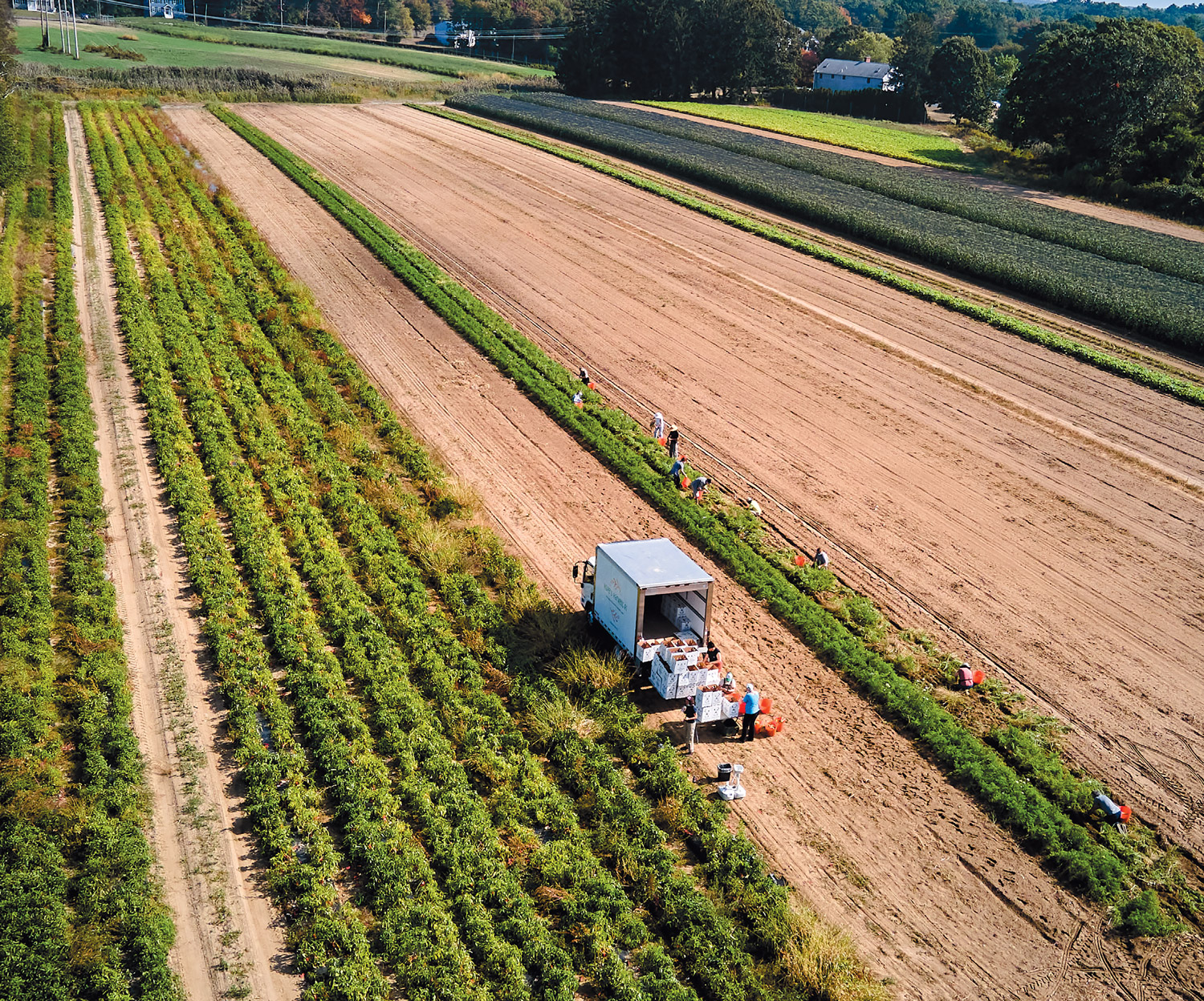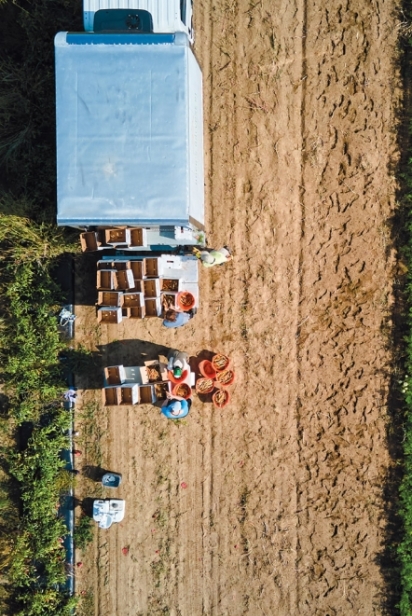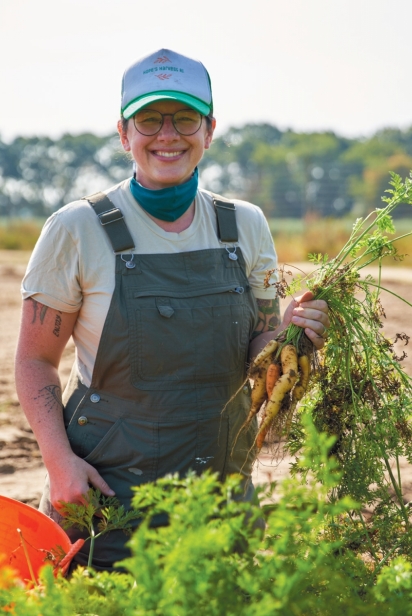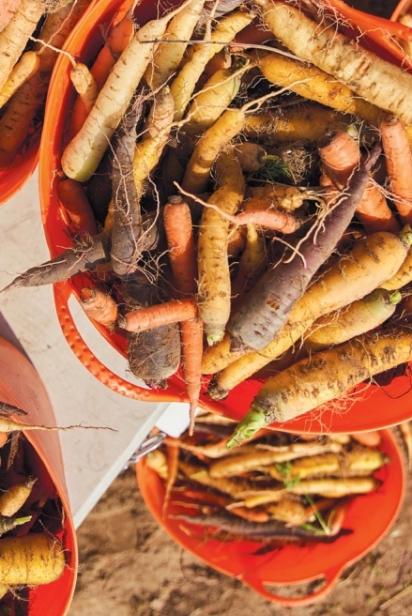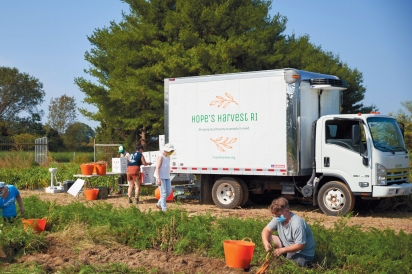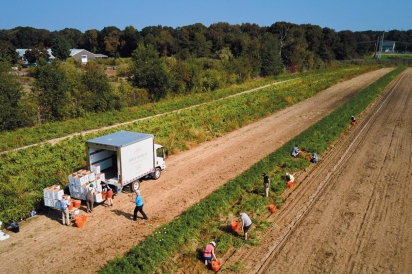Harvesting Hope Spring 2021
Eva Agudelo and Her Band of Volunteers Rescue Food from Area Farms For Hungry Rhode Islanders
The ancient practice of gleaning goes back at least as far as the Old Testament. In Leviticus 19:9–10, a “law” was handed down, stating: “When you reap the harvest of your land, do not reap to the very edges of your field or gather the gleanings of your harvest ... Leave them for the poor and the foreigner.”
That principle has been creatively reimagined and retooled for the current era of widespread food insecurity by Eva Agudelo. She is the founder and executive director of Hope’s Harvest RI, which connects volunteers to farms for gleaning fresh produce and then connects the produce to Rhode Island’s network of local food pantries and meal sites.
Her academic and life experiences have made Agudelo, now 39, just the right person to undertake the complicated organizing of Hope’s Harvest. At Mount Holyoke College, she studied social movements, political thought and the ethics of localism, and she went on to earn a graduate degree from the Friedman School of Nutrition Science and Policy at Tufts University.
When Agudelo moved to Vermont in her early 20s, she got connected to people who were farming, and she noticed: “They were working with the land and empowering themselves and others around economic and political power and how people think about their resources.”
When she moved to Rhode Island, in 2015, she became the assistant director of programs for the Rhode Island Community Food Bank (RICFB), a position she held for two years. She administered federal food nutrition programs, aided farmers markets and supported Rhode Island’s food distribution agencies.
Food Bank CEO Andrew Schiff praises Agudelo’s flexibility when working with farmers’ ever-changing schedules and adapting to each food pantry or meal program’s distribution schedules and storage capabilities. The Food Bank itself works with 159 member agencies, which include many kinds of food pantries and meal programs around the state.
“She knew that one size wasn’t going to fit all,” he says.
Schiff points out: “The demand for food assistance is the highest we’ve seen it since the Great Recession in 2009–10.” In fact, the RICFB saw a 22% increase in demand for food in the second half of 2020—a direct result of Covid-19.
Agudelo also understood the importance of getting fresh food to people in need.
“I see that as a food justice issue,” she says. “If you have to take a bus every two weeks to get to a food pantry, we want to coordinate our efforts so that what you get is truly fresh, because we just picked it.”
She mentions that some of the produce is top quality, “grade A,” but some of it may look a bit weird and still be quite fresh.
“Sometimes it’s not as clean as produce from a supermarket and needs washing at home,” she admits. “But we draw the line around food that is going bad or has spots or mold. Everybody has a right to high-quality food that isn’t on the verge of being tossed.”
If a volunteer picks up a squash with a soft spot, for example, and wonders aloud why a pantry shopper can’t just cut that spot out, Agudelo explains that, “it’s particularly disrespectful to give that to someone who’s food insecure.”
“We’re very strict about that,” she continues. “Imagine going to a food pantry already and then getting food that’s on the edge. It impacts people’s well-being and mental health.”
To initiate the work of Hope’s Harvest, Agudelo spent a year writing grants (early core funding from the Rhode Island Foundation helped secure other support; ongoing fiscal sponsorship under their 501(c)(3) comes from Farm Fresh RI), plus coordinating farm and food agency schedules and setting up training for volunteers. The first season of gleaning was in 2018, when they harvested 36,000 pounds of food; then 78,000 pounds in 2019 and 215,000 pounds in 2020.
“In 2020, we harvested 85,000 pounds of that from farms,” she says. “The rest was either contracted from eight different area growers or it was surplus food we purchased from seven area farms, to support them during this time of Covid and drought.”
Chris Clegg, operations manager and co-owner of the multi-generational family business Four Town Farm in Seekonk, is grateful for that support.
After failed attempts to set up a gleaning program with other organizations, Clegg says, “Eva had the workers, and she actually understood the farmer end of the gleaning process. Because of the many tasks I oversee, from employees to farm stands to growing food, the gleaning process needs to not put another burden on the farmer.”
That also means that in the three years Clegg has worked with Hope’s Harvest, the staff and volunteers have been, in his words, “very professional and courteous and respectful of the farm.”
Diana Kushner, founder of and organic farmer at Arcadian Fields in Hope Valley, says of working with Hope’s Harvest, “As a farmer, I feel compelled to help those who don’t have enough to eat. Hope’s Harvest makes it easy for me to do that. They do the hard work of picking, packing and delivery and all I have to do is grow the kale.”
According to one of the volunteers from the 2020 season, Rev. DL Helfer, he was glad to be “safely in community, working together to pick leftover fruit and vegetables, knowing that that food would soon be in the hands, and on the tables of hungry Rhode Islanders.”
“We were so blessed with the interest in volunteering,” Agudelo emphasizes, “that we stopped doing recruitments. It was great for my mental health [in the pandemic] to have that human interaction, and it was mutual. They gave us so much, and we were giving them an opportunity to be purposeful, social and serve the Rhode Island community.”
Getting that fresh food to people who don’t live near farms made a “big difference” at the RICFB, as Schiff says: “That fresh locally grown food wasn’t getting to us before. We knew there was surplus food at nearby farms, but we needed the organization to get it to the agencies that directly serve people.”
Hope’s Harvest stepped into that role, and as the organization has grown so has their staff, with an operations manager (Mollie Rose K Siebert), a full-time AmeriCorps VISTA member (Merl Schuster) and a two-person seasonal crew.
“I would like us to ensure that all food surplus is going to its highest and best use: feeding people in need,” Agudelo reflects.
“But I also want to make sure that farmers are viable and that they see the emergency food systems as a potential market for their business,” she continues. “I’d like everyone to recognize the connections.”
And although there are other “food recovery” programs in Rhode Island, such as through supermarkets, Hope’s Harvest is the only one getting food by gleaning what’s extra or left behind in farmers’ fields.
“We wanted to find our niche and stay there and do it well,” says Agudelo.
For more information, visit HopesHarvest.org.
MARK YOUR CALENDARS!
A Rhode Island Community Food Bank Virtual Panel Discussion
From Farms to Families in Need, featuring Hope’s Harvest, Farm Fresh RI & more
Hosted by Food Bank CEO Andrew Schiff
Wednesday, May 5, at 8:30 am
Learn how these organizations and others are working to get fresh produce from local farms to neighbors in need.
To register, visit RIFoodBank.org/events.


